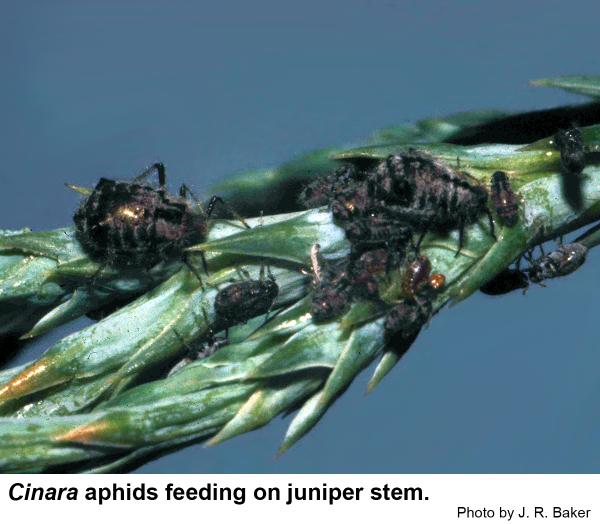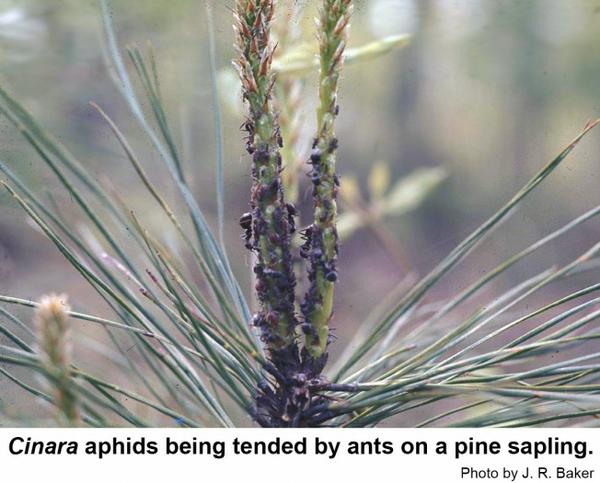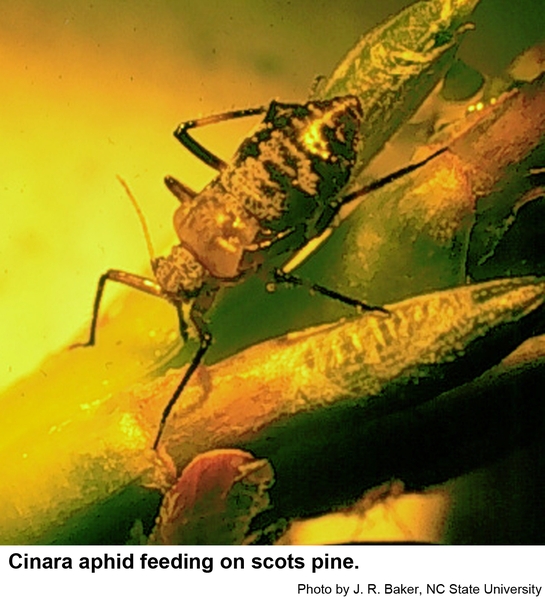Description and Biology
Giant conifer aphids, genus Cinara, are soft-bodied insects that are often found in large groups on conifers in the landscape. Giant conifer aphids are large (up to 1/4 inch long), long legged, and dark. Most aphids have a pair of tube-like structures on the abdomen called cornicles. The cornicles of Cinara aphids are cone-shaped. These aphids are wingless or may have wings. They have slender mouthparts that are used to suck sap from twigs, branches, trunks, and roots. Most species are restricted to feeding on one genus of tree. Some Cinara aphids such as the white pine aphid attack only one tree species. We have several generations a year in North Carolina. In spring, tiny aphids hatch from overwintering eggs. They molt through several stages, becoming larger with each molt. During the growing season all giant conifer aphids are females that give birth to live young. The last summer generation develops into males as well as females. They mate, and females lay eggs on needles or bark. Aphids secrete honeydew as they feed, and other insects, especially ants, bees, and wasps, feed on the honeydew. Some species of ants protect aphids from predators in order to harvest the honeydew.
Host Plants
Each Cinara species is specific to a tree genus or even a tree species. Heavy infestations of giant conifer aphids cause yellowing of the foliage and reduce tree growth, especially in young trees. Young seedlings may be killed by these aphids. Populations are usually highest in late spring and may crash by early summer. The best evidence of an aphid population is the presence of honeydew (clear, sugary, sticky liquid), ants attracted to honeydew, or ladybeetles and hover flies that prey on aphids. Honeydew is also a good growth medium for sooty mold and infested host conifers often become dark, sometimes almost black. Sooty molds also grow on the ground cover under a heavily infested tree.
Residential Recommendation
Several lady beetles, lacewings, and hover flies specialize in feeding on aphids. Parasitic wasps also prey on aphids. If it becomes necessary to treat, a dozen or so insecticides, including horticultural oils and insecticidal soaps, are registered for aphid control. When using any pesticide, thorough coverage is necessary. However, avoid spraying white pines and spruces with oils. Oils can remove the waxy bloom that give these trees the bluish appearance and treated trees may have a sickly yellow-green color until the wax is replaced or new foliage appears to mask the yellowish foliage. On such trees, consider using a systemic pesticide such as imidacloprid for aphid suppression.
References
- Aphids on Ornamental Landscape Plants. Steven Frank. 2019 (revised). Entomology Insect Notes, NC State Extension Publications.
- Genus Cinara, Giant conifer aphids. Anonymous. 2014 or before.InfluentialPoints.com.
- Giant Conifer Aphids. Anonymous. No Date. USDA Forest Service. Forest Health Protection, Rocky Mt. Region.
- Cinara Aphids on Christmas Trees in North Carolina. Sidebottom, J. 2019 (update). NC State Extension, Christmas Trees.
- Extension Plant Pathology Publications and Factsheets
- Horticultural Science Publications
- North Carolina Agricultural Chemicals Manual
For assistance with a specific problem, contact your local N.C. Cooperative Extension Center.
This Factsheet has not been peer reviewed.
Publication date: Nov. 12, 2013
Reviewed/Revised: Oct. 31, 2023
Recommendations for the use of agricultural chemicals are included in this publication as a convenience to the reader. The use of brand names and any mention or listing of commercial products or services in this publication does not imply endorsement by NC State University or N.C. A&T State University nor discrimination against similar products or services not mentioned. Individuals who use agricultural chemicals are responsible for ensuring that the intended use complies with current regulations and conforms to the product label. Be sure to obtain current information about usage regulations and examine a current product label before applying any chemical. For assistance, contact your local N.C. Cooperative Extension county center.
N.C. Cooperative Extension prohibits discrimination and harassment regardless of age, color, disability, family and marital status, gender identity, national origin, political beliefs, race, religion, sex (including pregnancy), sexual orientation and veteran status.



